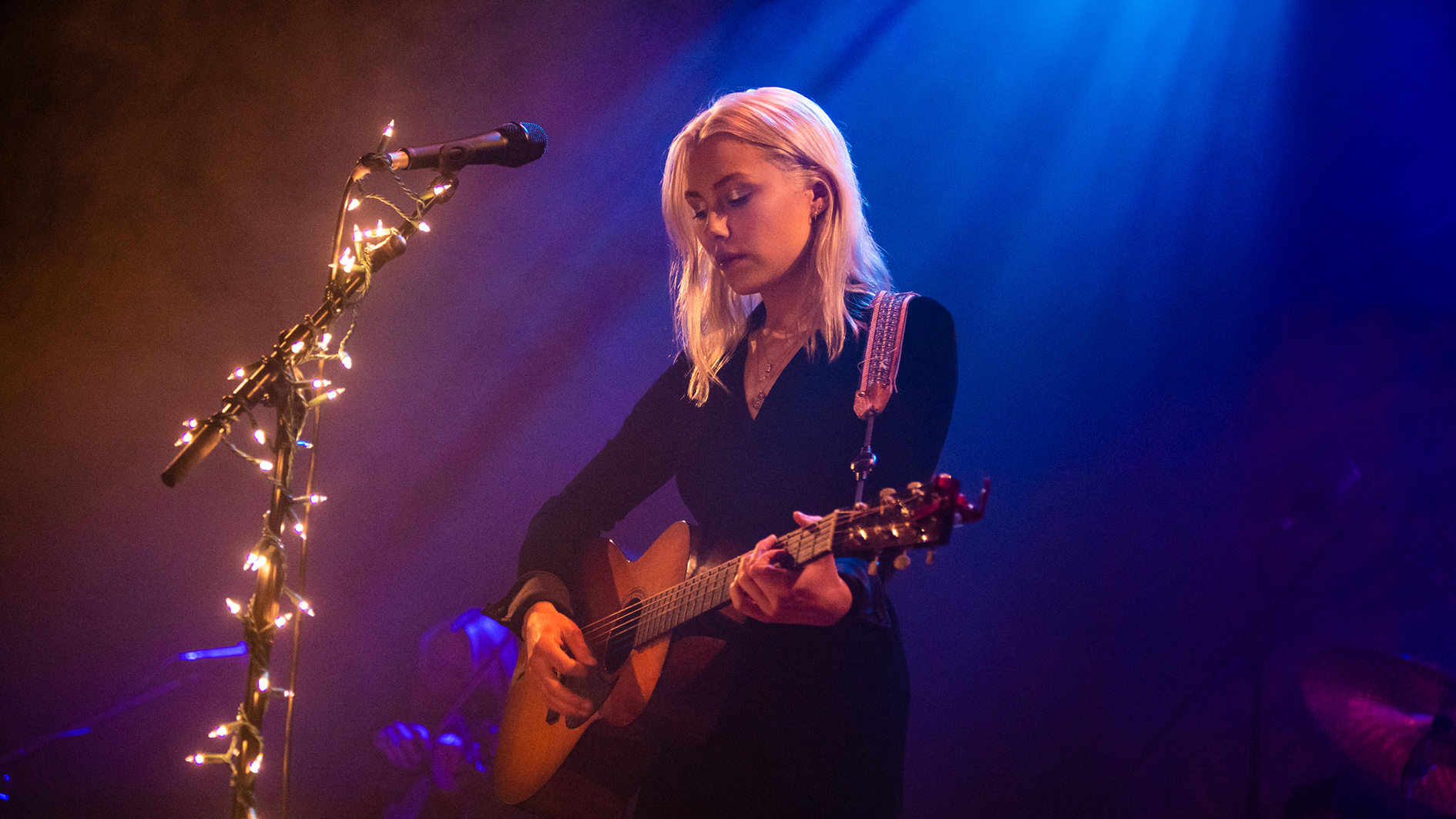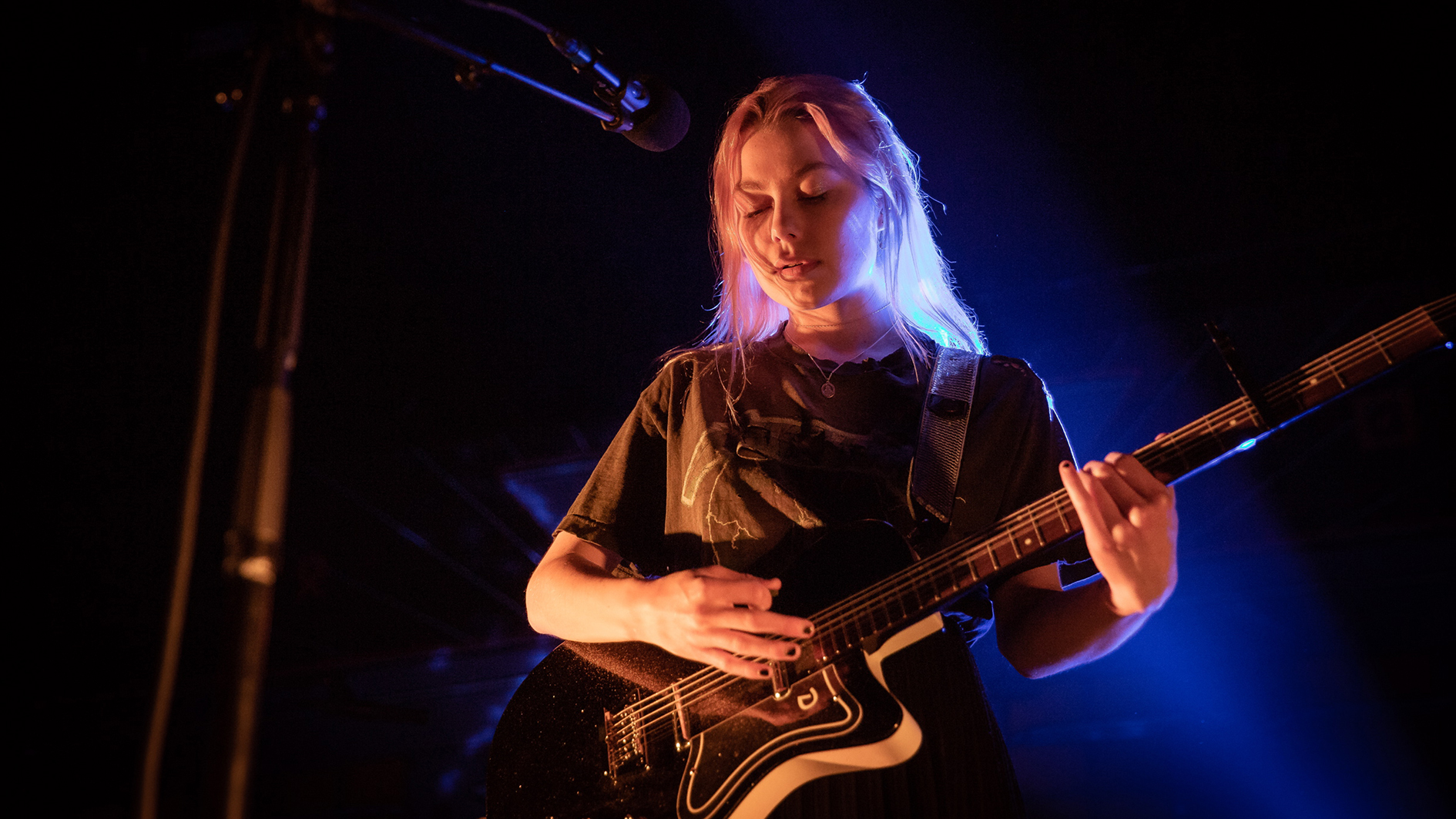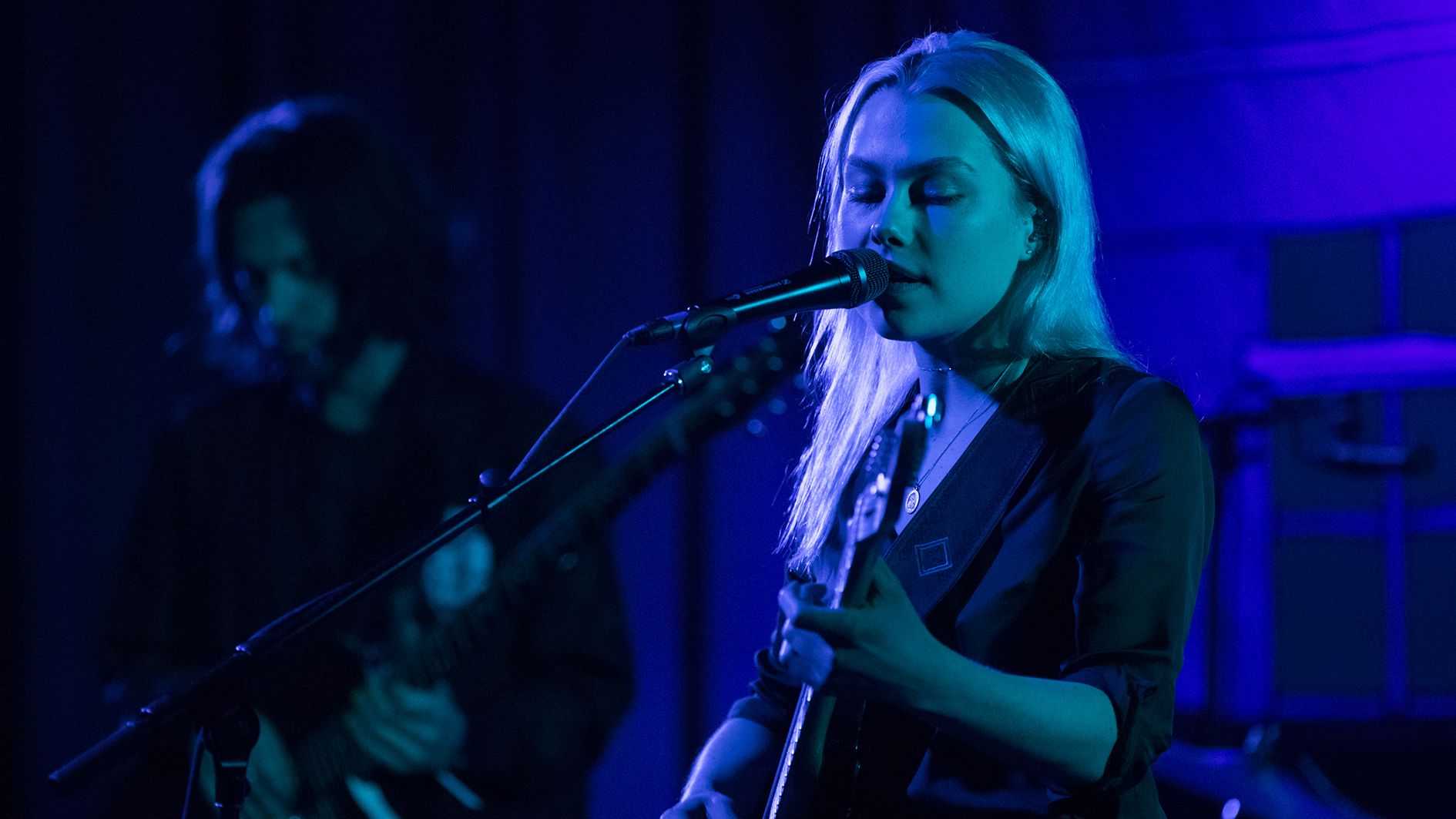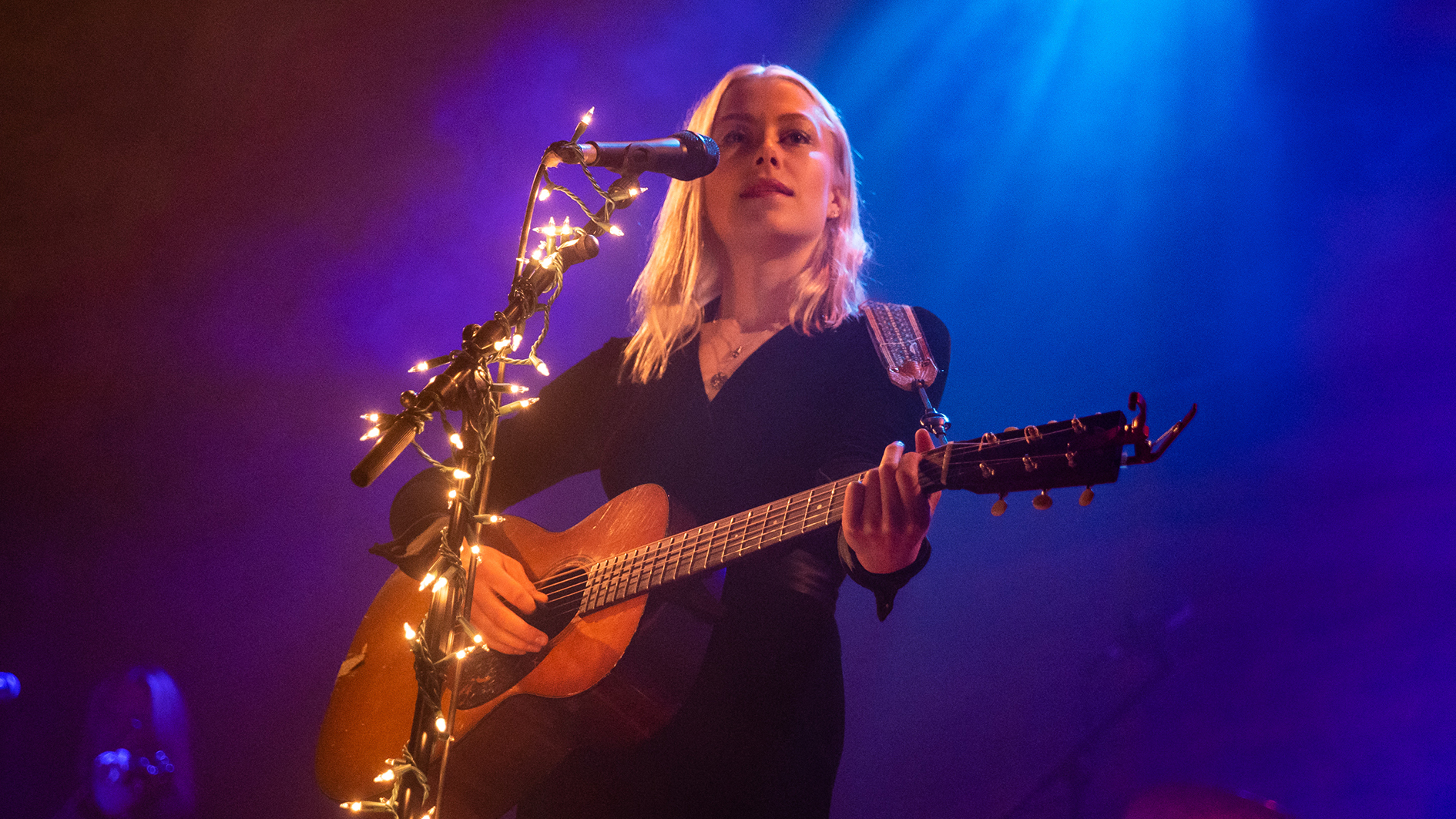Phoebe Bridgers: “I think of the writing process as going into the studio to f**k up the thing I just wrote”
The US indie-folk star talks gigging in pajamas, her love of baritones and how a flower-related injury made her rethink the way she plays guitar

Like most of us, Phoebe Bridgers - the singer/songwriter and indie linchpin - has found her time in lockdown has had its pros and its cons. “But I’ve been reading more, eating more, exercising more,” she tells Guitar World. “I feel like my quarantine body is Ronda Rousey, you know? I’m just getting really yoked. And I’m eating loads of peanut butter.”
Bridgers is frequently described as a master of insightful, observational writing. In person and on record she is self-aware, but nonetheless brutally honest in a way that is equally amusing and affecting.
Since her emergence in the late 2010s, her output has been prolific and multifaceted - from the expansive contemporary indie folk and open-tuned experiments on her 2018 debut Stranger In The Alps and its new follow-up Punisher, to her work with Bright Eyes in Better Oblivion Community Centre, or with Lucy Dacus and Julien Baker in boygenius.
Now, amid the home-based preparation for Punisher’s release, she has had the opportunity to consume again. “I’ve been constantly listening to records and that has been really comforting to me,” she says. “So [right now] I hope to do that for someone. I don’t want to remind people of what’s going on and I don’t want to distract people. I want to be there in the way that music always is.”
We spoke to Bridgers about home recording, avoiding ‘lead carriers’ and how an unhappy accident led to an obsession with open tunings.
What impact has the current situation had on how you play and perform?
I’ve never played to 10,000 people before! So it’s weird. It’s like living in an alternate reality, but I also feel really lucky to have a sense of purpose right now
“It’s made me become an engineer. I love gear, but I love gear that is handed to me on a silver platter by friends who will say, ‘This is what you have to try...’ I recorded at Sound City, too, so it’s like everyone around me is a gearhead.
All the latest guitar news, interviews, lessons, reviews, deals and more, direct to your inbox!
"So I’m into it, but I don’t seek it out. I’ve never home recorded before, but now I’m getting really good at it, so that’s been a silver lining.
“What freaks me out about the live situation is that, [for instance] I had barely washed my hair, I was in my pajamas and I started playing for Pitchfork Live and in like two minutes it was on 10,000 people and I immediately got crazy stage fright.
"I’ve never played to 10,000 people before! So it’s weird. It’s like living in an alternate reality, but I also feel really lucky to have a sense of purpose right now.”

What setup are you using for home recording?
“I’ve been recording through the Izotope Spire. It’s so sick. It’s this little at-home thing with one giant button in the middle. If you’re not a gear head and you want it to sound normal without trying very hard, it’s great. I do all my sessions on them.
"It’s like glorified voice memos and it means I’m not having to work on my laptop. It’s only eight tracks, which is great for me, because it stops me overdoing it. Then you can plug a mic into it - recently I’ve been using this AKG C414 B-ULS - and it’s a great preamp. Since I’ve been doing that, it sounds so much better and I feel like I took my glasses off.”
Let’s talk about your early years as a guitarist. You reportedly learned piano first, but hated it. Why did the guitar work where the piano failed?
I would wind up going to an arts high school, but with the kids there, you could say you played the piano, but unless you are a virtuoso you’re not a fucking piano player
“It just got easy all of a sudden. There’s kind of an end to it, whereas there’s an endless void with the piano. I was lucky, I would wind up going to an arts high school, but with the kids there, you could say you played the piano, but unless you are a virtuoso you’re not a fucking piano player.
"There’s less freedom to be a fuck-up. Whereas with guitar, it just got easier and I was just like, ‘I want to know all the chords’. Also, you could just pitch up on the street and play a song. I still wish I played piano. I know so many people who are technically piano fuck-ups, but it's great to have that tool onstage and go from one instrument to the other.”
You write using a lot of open tunings. Where did that first come from?
“I think the first time was probably when I was trying to learn some song, like Joni Mitchell or Sun Kil Moon, that I loved. But I actually fucked up my finger like a year and a half ago and it stopped me from playing E and F, which was in so many of my songs.
"I was cutting stems on flowers and the knife flipped and just hacked right on my knuckle. Since then it’s been really stiff and it hurts like shit. I hope that one day it heals but that’s been making me be more experimental with chords [and tunings].
“I play guitar in a weird way. When I met Tony Berg and Ethan Gruska, who produced both my records, I was basically a folk artist. It was sounding a little basic. Now I think of the writing process as going into the studio to fuck up the thing that I just wrote.
Tony Berg was like, ‘You need a baritone.’ It was like, ‘Oh. Well, this is the only thing I play now!’
"It’s like, ‘Show me a mode I can play in’ or ‘Show me an instrument I’ve never played.’ So [similarly] I try to trick myself to write a song in an open tuning and not even worry about what the chords look like and focus on the melody instead. I’ve learned so much about my favorite gear that way, as well as my favorite chords and tones.
“Tony Berg was the first one who put me on to baritones because I was tuning the bottom string of my guitars down to C open and he was like, ‘You need a baritone.’ It was like, ‘Oh. Well, this is the only thing I play now!’ [I have a Danelectro '56 and] it’s perfect for me.”

With your mom’s, erm, “encouragement” you did a lot of busking early on. When was the first time you busked and how did you feel about that as a kid?
“I don’t really remember the first time but I do remember she made me do it at Times Square at one o’clock in the morning! I always say she would totally have been a ‘momager’ if she knew how to do that, but instead she was making me busk and making me do the fucking open mic night at the Folk Music Center. She made me go up and introduce myself to Richard Thompson once.
“I would always play the farmers’ market near my house and it sucked! I was so depressed. I had no job, so she was like, ‘You’ve got to work for five hours every Saturday, get out of bed!’ I’d be like, ‘I can’t today...’ It’s just it’s a special feeling to be ignored for that long and also I did not have five hours of music at that point! I also had this one guy who followed me around and that was kind of scary.
“I would invite my friends to sleep over at my house so that we could wake up in the morning and then go and play. But however it started, which I actually don’t know - beyond knowing that I’m not that organized and I didn’t have a car - it turned into a very important part of my high school life.
"Harrison, who plays with us still, would sleep at my house and then we would go and jam all-day. It was always more fun with more people.”
At the risk of being twee, do you feel like you learned any valuable lessons from that early experience?
I was so deeply ignored busking for so long that it gave me an ability to power through
“Yeah. I just actually covered First Day Of My Life, the Bright Eyes song, for something. They wanted a happy song and I was like, ‘Oh god. I hate happy songs.’ That one popped into mind and I did it and I thought, ‘Why is this so easy?’ Then I remembered that I used to play it all the time [busking].
"So I definitely learned useful lessons. One of the main ones was just being OK with people ignoring you. Now, when I play shows and there’s a loud bar at the back - to a degree, if it’s like someone screaming at their girlfriend then I will fucking get the person kicked out – but if it’s just the crowd being rowdy, I’ve seen people crumple before, but that just bounces off me.
"I was so deeply ignored busking for so long that it gave me an ability to power through. I also don’t ever, ever get stage fright, unless I’m on television.”
Your list of collaborators - Conor Oberst, The 1975, Lucy Dacus among others - is really impressive. It seems like you’re one of these people who is good at connecting people. Do you feel that’s the case?
“I do. I have always felt that way. Again, I went to an arts school and pretty quickly found people who, for example, hated opera - newsflash! - and wanted to play rock shows instead. So that was part of it.
"Then, when I got older, I just met more and more people. I admire people with old friends. I think that’s the mark of a good person. There’s nothing weirder than someone who keeps recycling the same - in rap, they call them ‘lead carriers’ - second-tier friends that you keep around to tell you you’re great all the time.
"Then I meet people who have been playing in the same bands since they were teenagers and are best friends with the same four people and that to me is fucking amazing. I think, as an adult, I’ve sort of accumulated people who have those teams.”
On the gear side, what are your favorite guitars at the moment?
I have a J-45 that used to be Glen Campbell's, but it’s not allowed outside and you’re not even allowed to tune it different
“Conor Oberst got me a totally murdered-out Waterloo guitar a couple of years ago for my birthday and that’s my prized possession now. Even the tuning pegs are black, the pickguard is black. Collings makes them and I feel like Collings are my favorite new guitars, by far.
"I just love them. I used to play this Epiphone Frontier from like 1968, with the lassoes on it, but it snapped, like in-half, on tour. It was already going that way, but I learned my lesson about vintage guitars. Then I was like, ‘But I don’t want to play new guitars’ and I discovered Collings and that was it.”
“In the studio I play this J-45 that used to be Glen Campbell’s. It was clearly in some sort of house fire or something because it’s insanely dry and it’s just the craziest-sounding instrument. I would love to be able to recreate that sound live, but I haven’t recreated it on any guitar yet. It’s on all my records, but it’s not allowed outside and you’re not even allowed to tune it different."

On the electric side, what’s your favorite amp and FX?
“I use effects. I have one of those Mellotron pedals that’s supposed to sound like a choir and an orchestra [an Electro-Harmonix MEL9]. It sounds kind of fucked. It’s supposed to sound like clarinets but it makes this screeching horrible noise if you put too much through and I kind of love that.
"Julien Baker uses the male voices all the time, which is so rad. I use my Echorec [echo] indiscriminately and I think it gets on people’s nerves. They’ll be like, ‘There’s so much delay on this I don’t know what your timing is!’ I’m like, ‘But it sounds cool…’
"Then I play through a Fender Reverb amp, very reliable, very sweet. I also have a knock-off Klon Centaur. I brought it into the studio and Tony was like, ‘Here’s the real one,’ which is crazy expensive. I was like: ‘Fuck you.’”
Things have changed a lot for musicians in the last decade and even more radically in recent months. What principles about music-making have endured for you in all situations?
If you’re constantly excited by what you’re doing, which is possible for everyone, everything will bounce off you. You’ll be able to get through
“I think the main thing is just that if you like it, everything will bounce off of you. If you release something that you love and nobody fucking listens to it, it’ll be like, ‘Oh well. I just need to find the people who like this, because I know I genuinely like it.’ If you hate your music, or you half-assed it, or you let someone tell you how it should sound and you relented, not that compromise isn’t good, but [you’ll regret it].
“I think that’s what’s helping me through this time. I like this record, so I’m excited to get it out, but if I didn’t I would be making all kinds of excuses, like, ‘The world’s too weird, we should wait...’ and I wouldn’t be able to talk about it.
"If you’re constantly excited by what you’re doing, which is possible for everyone, everything will bounce off you. You’ll be able to get through.”
Punisher is out on June 19 via Dead Oceans.

Matt is Deputy Editor for GuitarWorld.com. Before that he spent 10 years as a freelance music journalist, interviewing artists for the likes of Total Guitar, Guitarist, Guitar World, MusicRadar, NME.com, DJ Mag and Electronic Sound. In 2020, he launched CreativeMoney.co.uk, which aims to share the ideas that make creative lifestyles more sustainable. He plays guitar, but should not be allowed near your delay pedals.



![[L-R] Joe Satriani wears dark shades and smiles as he solos on his Ibanez JS signature model; Ian Anderson strikes a pose as he plays the flute; Yngwie Malmsteen pulls his aviators down to give the camera some eye-contact in this portrait from 2019](https://cdn.mos.cms.futurecdn.net/qpBDNvdaGjWXpBHjWdQG7S.jpg)